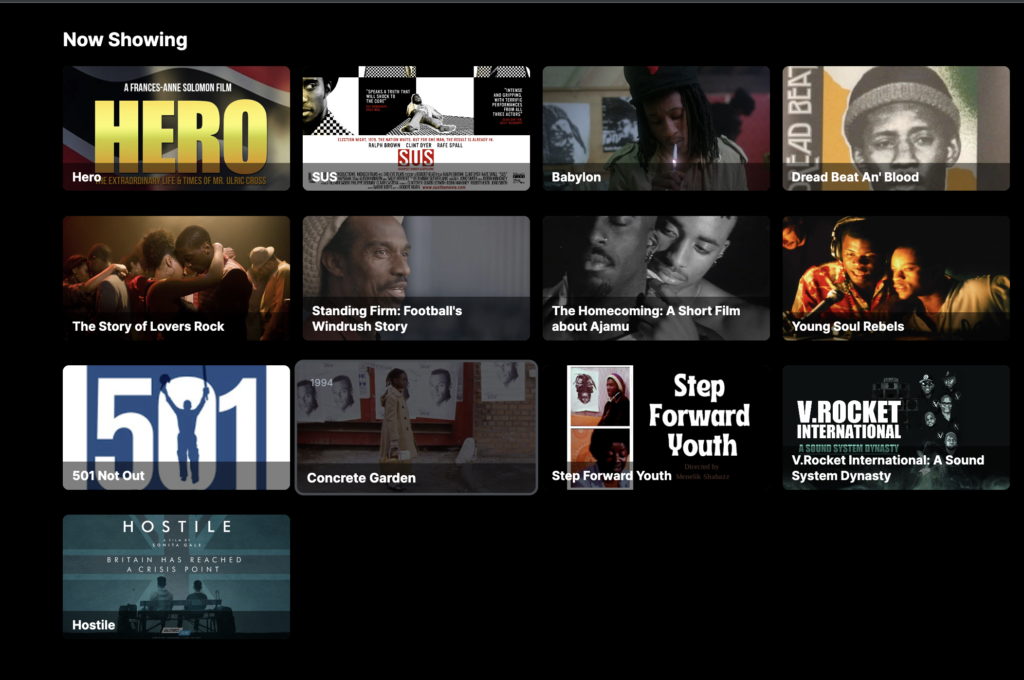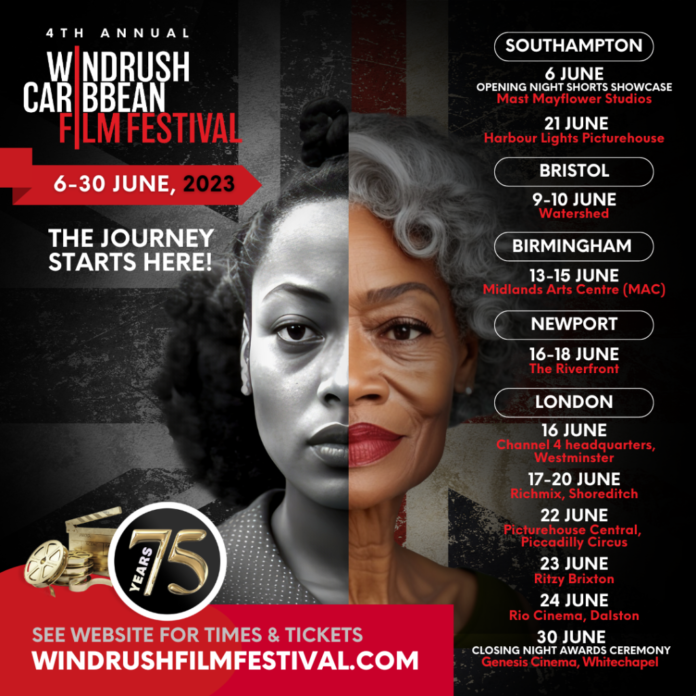( ENSPIRE Entertainment ) Showcasing the History of the Windrush Generations
ENSPIRE Contributor: Petra Wolf
This June marked the Windrush Caribbean Film Festival, celebrating the artwork of generations of Caribbean people in the United Kingdom. Dozens descended on Rich Mix, London for the launch of this year’s Windrush Caribbean Film Festival. The “Windrush Generation” refers to over 800 Caribbean passengers of the HMT Empire Windrush who moved to the UK in 1948. This was in part because of the British Nationality Act being passed the same year, which gave people from British Colonies the right to live and work in the UK. For 75 years generations have established themselves in the country and now make art to honor their origins.
For the first time in the festival’s history, the cities with the strongest historical ties to the Windrush generation could host the festival. The event celebrated over 40 screenings and talks and moved across 5 cities. The historical city of Southampton became the location for the opening night. The festival then took place in Bristol followed by Birmingham, Wales, and the Rich Mix Theatre in Shoreditch, London. This move to hold the festival in multiple locations, according to Artistic Director Emmanuel Anyiam-Osigwe, demonstrated the intent, ambition, and purpose.

ENSPIRE met with a representative from the festival to go in-depth about the history and future of the WCFF.
Can you tell us about the significance of the 75th anniversary of the arrival of the HMT Empire Windrush and how it is being commemorated in this year’s Windrush Caribbean Film Festival?
As the trailer for WCFF 2023 presents, the 75th anniversary of HMT Empire Windrush’s arrival in the UK commemorates 75 years of memories. 75 years of hopes, dreams, and searching for justice after they answered the call to help rebuild post-war Britain. From every walk of life across the Caribbean, strong and selfless men and women shaped modern Britain. Yet their stories are not known.
Our Festival was born from the need to showcase the many contributions the Windrush generation and their descendants made to Britain. We had to fight every inch to get an acknowledgment of the many contributions of Black Britons. Even more tragic, we still must fight to be recognized as rightful citizens of this country despite all the sacrifices we have made. So, this Silver Jubilee is not a celebration. Instead, we commemorate the determination, courage, and selflessness that the Windrush have demonstrated.
What can audiences expect from this year’s festival in terms of film screenings and talks, and how does it reflect the festival’s intent and purpose?
The WCFF programme for 2023 centers on the legacy of Black British filmmaking during the past 75 years. Combining new works from up-and-coming creators and drawing on films from our archives, we have put the storytelling of the Windrush generation and their descendants front and center. We continue to reinforce the strength of this community and affirm its value. As seen with the pivotal Shoah project on the Holocaust, capturing and sharing the stories of those who have suffered and survived monumental injustice are essential to the healing process and the historical record. This is especially crucial as the Windrush generation is sadly passing on.
Could you elaborate on the historical ties between Southampton and the Windrush generation and why it was chosen as the host city?
When 492 settlers from the Caribbean disembarked HMT Empire Windrush on 22 June 1948, the iconic Windrush Generation was born. However, some 200 travellers from the West Indie arrived in Southampton in March 1947 aboard the Almanzora and ships continued to bring settlers from the Caribbean to start their UK journeys in Southampton.
Could you highlight a few films from the official selections that you find particularly compelling or significant in showcasing the stories and experiences of the Windrush generation?
Of over 40 screened films, we point you to Asunder by Janet Marret (2021), Black and Welsh by Liana Stewart (2020), No Regrets by Arthur Torrington (2023) and Step Forward Youth by Menelik Shabazz (1977). These films tell the story of a trainee solicitor seeking justice for her mother, the experiences of settlers to the UK during the Windrush era, explore what it means to be Black and Welsh while sharing the voices of youth discussing school, police, family, and what it is like to be black in a white world.
How does the Windrush Caribbean Film Festival contribute to preserving and sharing the cultures, struggles, and resilience of the Caribbean community, as mentioned by Festival co-founder Frances-Anne Solomon?
WCFF is the UK’s only annual film festival dedicated to telling the stories of the Windrush generation, their descendants, and the wider Caribbean diaspora. This intergenerational focus allows us to feature rarely shown films from the past, work from newer unknown artists, academic analysis of past legacies, and cultural comments on what changes may come in the future.
Despite a rich film history, African Caribbean filmmakers have had limited opportunities to showcase their work. This is especially true with work that does not fill stereotypical views about our communities to focus on violence, gangs, or drugs. As we experienced when promoting the inspiring film HERO in 2019, getting screen time was incredibly hard work. Without the support of several community-based cinemas and the Picturehouse group, we would not have had the breadth of screenings that we achieved. We found that commercial cinema chains are not supportive of work they view as uncommercial. WCFF seeks to ensure that our stories reach a wide audience. Going digital will give us a global storyboard.
What role do you see film and storytelling playing in raising awareness about the Windrush generation and promoting dialogue about themes such as history, identity, and social justice?
WCFF is founded on storytelling. The festival focuses on justice as the Windrush generation continues to fight for compensation and Britain’s Black communities face devasting racial and social injustice. WCFF launched in 2020 with the theme of Justice and the Festival inaugurated the Paulette Wilson Award to honour Windrush justice champions.
In 2021 WCFF celebrated the Art of Carnival, undoubtedly a major cultural asset in the UK by celebrating the history of Carnival in Britain from the first indoor celebration organised by Claudia Jones in 1959 to a virtual Notting Hill Carnival. In 2022, using the backdrop of the Commonwealth Games taking place in Birmingham during the summer, we drew a red thread connecting the British Empire of past subjugation and oppression with the Commonwealth today emerging as a family of independent and equal countries.
Can you tell us about the festival’s partnerships and sponsors, and how they support the mission and objectives of the Windrush Caribbean Film Festival?
A nationwide consortium of leading community, business, arts organizations, and educators who have come together as volunteers to help us attract a broad, diverse multi-generational audience supported the Windrush Caribbean Film Festival. Our partners are our hosts, panelists, and workshop leaders. We have also enjoyed support from funders such as BFI, the Arts Council, Caribbean heritage filmmakers from Africa and the Caribbean, UNISON, and Caribbean Tales.
In the four years we have been delivering the festival, we have seen that there is an audience for it. With the right support, not the bootstrapping we have had to make do with, a well-marketed world-class event can be delivered for years to come. From here, we can be self-sufficient and provide a sustainable platform for African and Caribbean heritage filmmakers in Britain to share their stories. Eventually, we want to include creatives from the visual arts, theatre, music, and literature to offer a broad-based cultural festival.

The festival was held until the 24th, 2 days after the UK’s National Windrush Day. Awards were given out to filmmakers including Adjani Salmon, Nadine O’Mahony, Gavin Porter, Aaron James Robertson, Rudolph Walker, and Alex Pascall. Salmon received the new legacy award, named after Menelik Shabazz. Melink Shabazz recently passed in 2021, a Barbadian filmmaker well known for 40 years of Black Cinema in the UK. He also founded the Black Filmmaker Magazine collaborating internationally with Black voices in U.S. and Europe.
The chance to submit a film for the 2024 festival is now open. More information on costs and requirements can be found here.
Related Links: The 2023 American Black Film Festival Pop-up In Miami, New York African Film Festival Celebrates 30th Anniversary at Film at Lincoln Center







